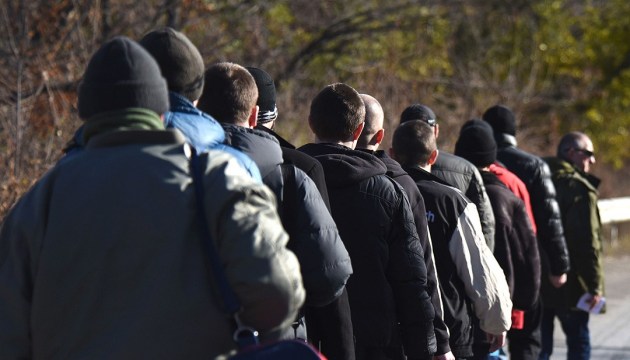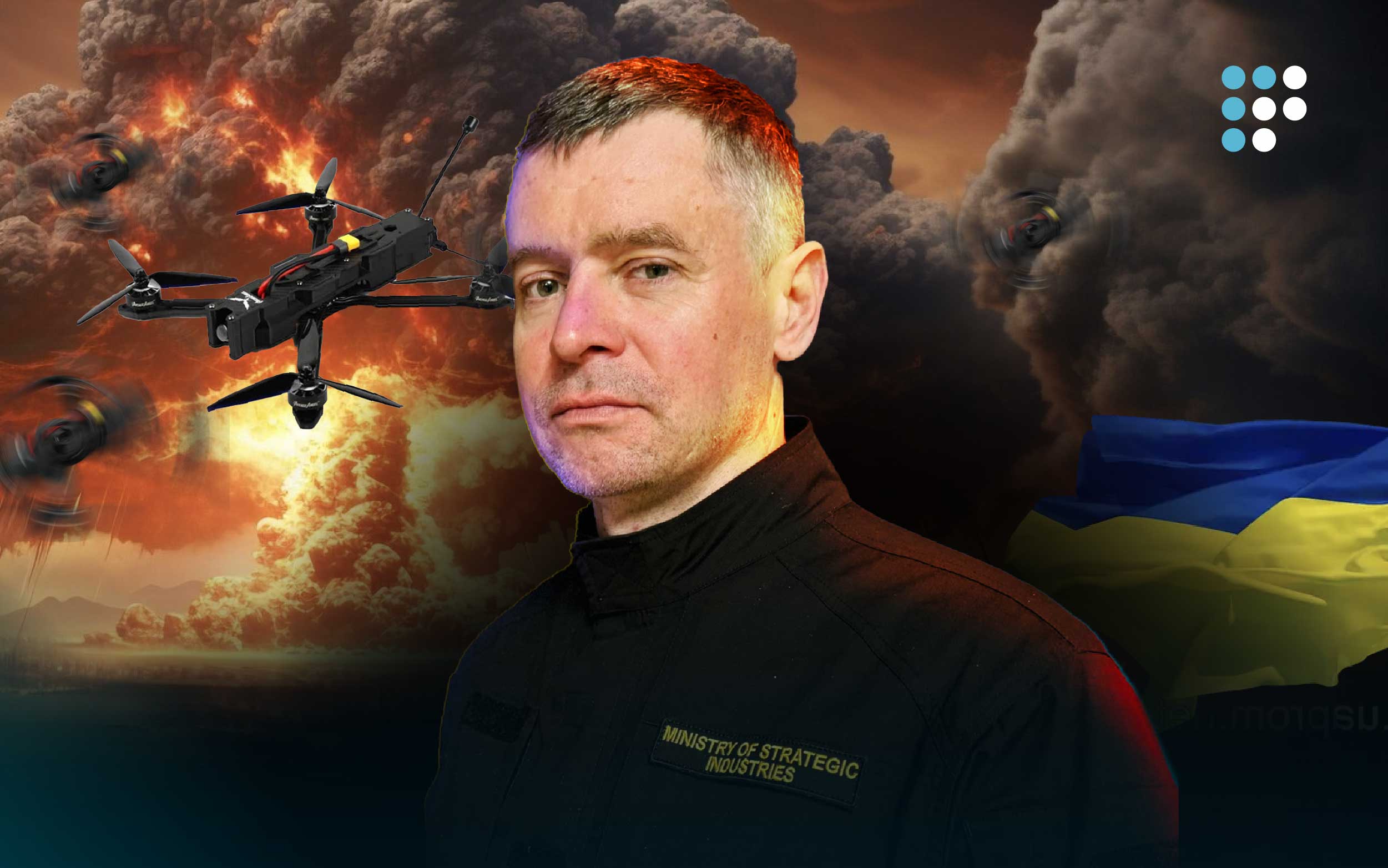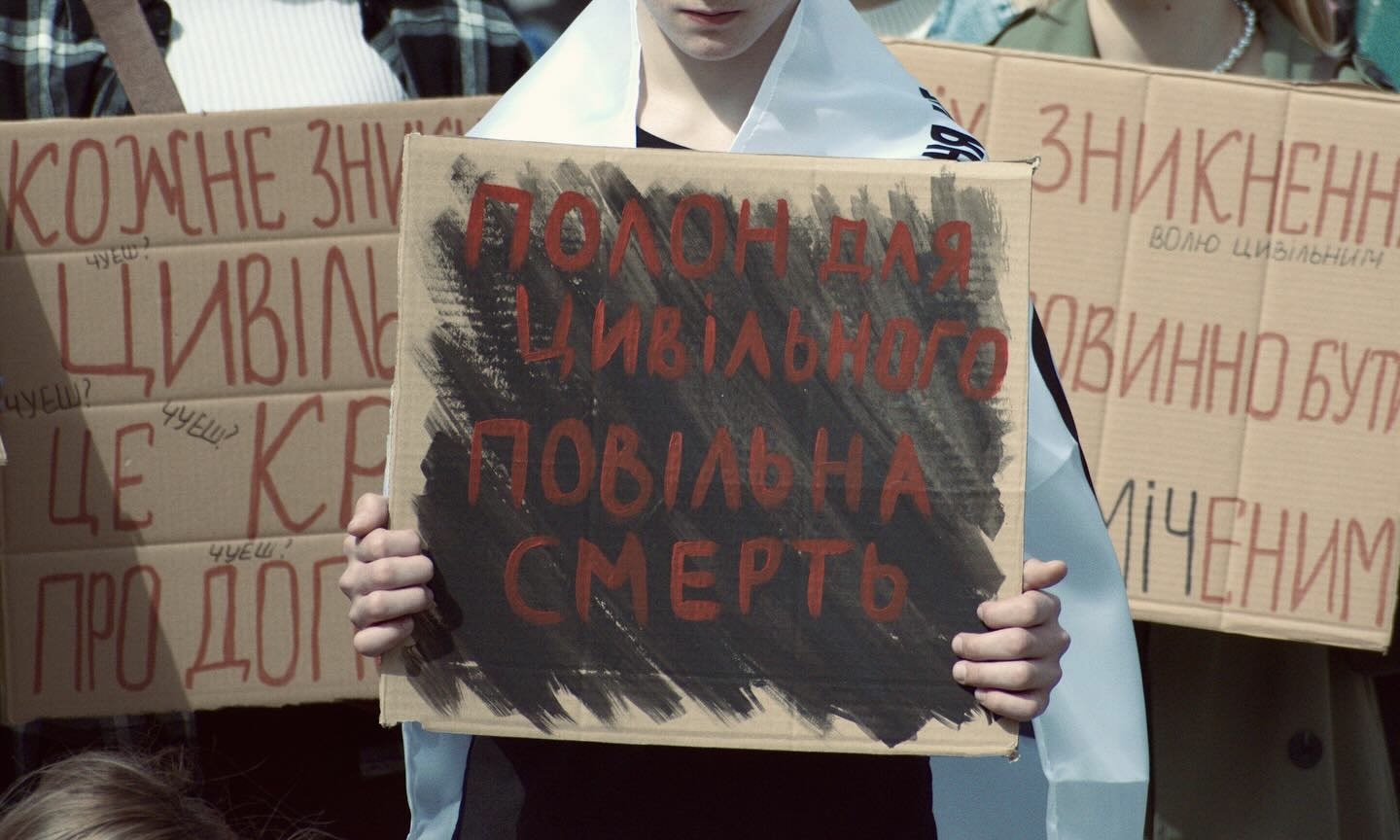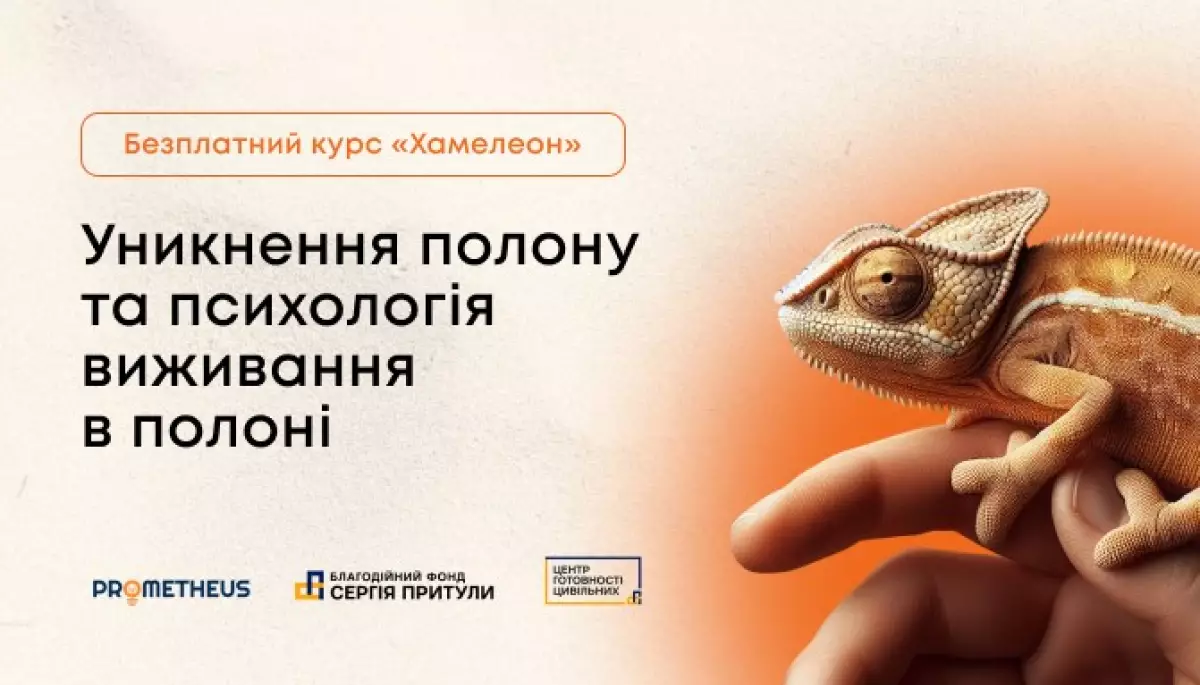
Prisoners and Captives in Ukraine
This week Marko Suprun hosts a conversation with Dmytro Potekhin, former prisoner of the Donetsk People’s Republic
Welcome to Ukraine Calling, a weekly roundup of what’s been happening in Ukraine focusing on a main story. I’m Marko Suprun for Hromadske Radio in Kyiv and here’s look at some of the main stories that happened this week.
Prisoners
Luba is a prisoner in her own home. “For three years, I’ve been sleeping in my clothes,” she said Luba Sorokina, a 70 year old resident of Avdiyivka, a town that is under constant fire and shelling was interviewed by Hromadske Radio correspondent Kateryna Kader this week. Her story is the story of millions of residents of eastern Ukraine living with the consequences of Russia’s invasion. Most of her family have left and are scattered around Ukraine. There are more internally displaced people (IDP) in Ukraine than there are Syrian refugees in Europe. Think about that. Russia invaded & occupied Crimea and then invaded & occupied parts of Ukraine in the east. Ukrainians left their homes but did not leave their country. “My granddaughter is living in Vinnytsia, because that’s where they evacuated the Donetsk National University,” she said. Luba also lives with the loss of her daughter-in-law, who died from catastrophic blood loss when she was wounded by shrapnel. Some of her neighbours call her a “traitor” behind her back because she helps feed members of the Ukrainian armed forces that are stationed near her home. One of her neighbours warned her that she should be careful, because one day the DNR will come there and make her pay. To which Luba says, “I’m 70 years old. What they would do is all the same to me.” The story is in Ukrainian, but we’ll include a link on our site. Find someone who speaks Ukrainian to have it translated. It’s worth your time.
Donetsk MGB
Almost immediately following the creation of the Donetsk People’s Republic they set up a Ministry for State Security and they regularly release videos of Ukrainian prisoners of war. This week they released a video of Lilia Kots who was taken captive about four months ago. She was part of the movement that created the Ukrainian Volunteer Army, formerly part of the Right Sector that had units stationed in the occupied territories. Hromadske Radio interviewed her former commander, who goes by the call sign “Cherven” about the video and he claims that she was most likely tortured. The Security Service of Ukraine, the SBU, said they will be verifying the information about her capture.
State Security
The SBU also announced the capture of an agent of the Russian Federation’s Army General Staff in the western city of Rivne. The agent was caught while trying to recruit an officer of the Ukrainian Army, offering him and his family Russian citizenship and money. The curator of the agent is one Oleksandr Ilyukin who works for Russian military intelligence. The Ukrainian officer to whom the offer was made, reported this to the SBU and in a special operation, had the recruiter arrested.
The Security Service of Ukraine is the state agency that is technically charged with administering the release of Ukrainians being held by the Russian occupation authorities. To date, 3082 Ukrainians were found and released, of which 1484 were civilians and 1598 were members of various branches of Ukraine’s armed forces. 111 Ukrainians remain in captivity, 9 of which are being held on the territory of the Russian Federation according to the SBU (Ukraine’s Secret Service) https://ssu.gov.ua/ua/news/1/category/201/view/1912#sthash.eytwoHT4.dpbs
Later in the show we’ll hear from Dmytro Potekhin, a local Ukrainian activist who was held against his will by the DNR for almost 50 days in 2014.
Ukrainian Political Prisoners in Russia
Ukrainian citizens Mykola Karpyuk and Stanislav Klykh lost their appeal in the Russian Appealate Court this week and will remain behind bars in a Russian prison. Like Oleh Sentsov, the Ukrainian filmmaker who has been sentenced to 20 years of hard labour by a Russian kangaroo court, they were captured in Ukraine and taken to the Russian Federation in 2014. They have been charged with killing Russian nationals during Russia’s war against Chechnya. The appeal was attended by several ambassadors from the European Union as well as former prisoner of war and Member of Parliament, Nadiya Savchenko. Savchenko said she attended the hearing because Ukrainian media fail to cover the plight of Ukrainians held in Russian prisons. “When no one from Ukrainian media report on their status, when European parliamentarians remain silent, it is very difficult for them (the prisoners) to not feel support,” she said. Karpyuk and Klykh are being held in a temporary isolation facility in the city of Grozny, Chechnya and took part in the hearing via video link.
In an article that appeared on Euromaidan Press, well known journalist Vitaly Portnikov said what a lot of people were thinking that Savchenko was trying to win political points at home, and that she is “a person that can become a factor in destabilizing Ukraine – a live bomb.” He also said that “we needed to stop thinking about Savchenko and her attempts to live up to her own image and, instead, to focus on those remaining in Putin’s dungeons. It is better to channel our energy and emotions for these people.”
Meanwhile, Savchenko’s own lawyer, Mark Feygin, also commented that her presence in Moscow at the trial actually does more harm to Ukrainian political prisoners, than good. It creates the impression, at least in the Russian information space, that the situation between Ukraine and Russia is tense but without animosity and that Ukrainians can freely visit Russia. Feygin said that in the current atmosphere in Moscow any Ukrainian “can be arrested and be accused of anything” and that spontaneous visits like this create a false sense of security.The Ukrainian Ministry of Foreign Affairs for their part,has called for Karpyuk’s and Klykh’s immediate release.
The War
The town of Stanytsia-Luhansk remains a hotspot. Russian occupation proxies set up a sniper ambush across the Siversky River lasting for about an hour. They continue to use 120mm calibre weapons that are supposed to be forbidden by the Minsk Agreement. One Ukrainian soldier was wounded on October 26 in the Donetsk sector by an explosive device. The town of Avdiyivka continues to be the site of intense battles including mortars and heavy weapons. Colonel Lysenko, the Ukrainian spokesperson for the war zone, noted that as usual, the weapons are fired from the east. On October 27, Russian backed proxies launched over 220 mortars at Ukrainian positions along the Krasnohorivka-Maryinka-Pavlopil-Shyrkonie line. There were 19 attacks of heavy munitions and 43 firearm incidents. One Ukrainian soldier was killed and three were wounded. According to another official Ukrainian spokesperson, Colonel Motuzniak, Ukrainian police in a routine inspection stopped a shipment from the war zone that was headed for the city of Zaporizhya. The package contained six rounds of ammunition, a grenade and narcotics.
Drones Over Luhansk
A member of Ukraine’s National Guard, Maksym Kasyanov, released drone footage filmed over the occupied city of Luhansk. The pictures are impressive for what’s missing: there is almost no movement, no cars and looks very similar to aerial photos taken of North Korea. We’ll include a link to the photos on our site.
OSCE
The OSCE continues to maintain that all sides to the conflict should remove troops and equipment from the contact line in a move they tout will build trust. At a meeting of the trilateral contact group, Martin Sadik from the OSCE, (also known as Captain Obvious) said that keeping to a cease-fire would quickly bring about a de-escalation of the conflict. The OSCE continues to move for elections in the regions and the implementation of the Steinmeyer Formula, which now includes an amnesty component. In response, Ukraine suggested that the quasi-government structures that were created in the occupied territories be dismantled. Darka Olifer, press-secretary for Ukraine at the on-going talks in Minsk said that “elections on territories not under Ukrainian control, in which we find 40 thousand members of a foreign army and equipment, is not possible.”
NATO
At the Warsaw Security forum this week, Former President of Estonia, Tomas Kendrik, had a case of déjà vu all over again. He was talking about the mood in Estonia following their independence about joining NATO. That is, that people thought it better to not rock the boat and that he sees the same thing happening now. He said, “I see this happening in Ukraine today. We’ve witnessed an invasion and part of their territory has been occupied,” referring to the Russian occupation of Ukraine’s Crimea peninsula and portions of its eastern territories. “There are thousands of armed soldiers of the Russian army and still a portion of the people continue to say ‘don’t rock the boat.’” Estonia also announced that the 2017 Eastern Partnership summit, that will include Georgia, Armenia, Azerbaijan, Ukraine, Moldova and Belarus, should be held in Brussels and not Riga when Estonia will be chairing the European Union. The United Kingdom announced that it will be stationing 800 members of Her Majesty’s Army in Estonia, one of the first anticipated moves made by NATO to calm fears in the region regarding threats made by Russia to the Baltic countries’ security. French and Danish troops are expected to join their UK counterparts in the spring of 2017.
NATO General Secretary Stoltenberg also announced at press conference this week that they have confirmed two Russian warships in the Baltic Sea. The two warships, “Zeleny Dol” and “Serpukhov” were sighted and identified as the same ships that launched cruise missiles at targets in Syria. The home port of these two ships is Sevastopol on the occupied Crimean peninsula. Earlier it was thought that the two ships would be returning to the Mediterranean, however, the Ukrainian Ministry of Defence’s Main Intelligence Directorate issued a statement back in September that the ships were to be transferred to the Baltic via Russia’s inland waterways. Apparently, they were right.
At the same time, NATO also decided to shore up member states in the East and has come to an agreement that Canada, Turkey, Poland, the United States, Germany and the Netherlands will set up a presence in Romania. The exact number and make-up of this presence is yet to be determined.
FOCUS: Russian Proxies Building Concentration Camps in Occupied Donetsk – A conversation with former prisoner, Dmytro Potekhin.
Suprun: Dmytro Potekhin is a Kyiv-based political expert and trainer specializing in nonviolent resistance strategies and co-founder and CEO of the Nonviolent Solutions Agency.
His experience includes work at the embassy of Japan to Ukraine as a political analyst, management of a major civic campaign to prevent the falsifications of the 2004 presidential elections in Ukraine, training hundreds of democracy activists around the world in nonviolent strategies and volunteers with a nongovernmental organization that provides first aid medical training and also as the head of the Kyiv city police re-evaluation committee.
In 2010 he wrote that power in Ukraine was usurped by the Yanukovych regime. He suggested a strategy to stop the usurpation by denying to recognize and call Yanukovych the president of Ukraine. According to Dmytro, this would have increased chances for a change in loyalty among the security officers making it easier for them to join the protesters and protect people.
Dmytro has experience working as a freelance journalist and as a fixer with international media. In 2002 he helped to start the first public radio project in Ukraine as a manager of its internet programming. In 2014 he was writing material for a Canadian journal and the assignment took him to terrorist-occupied Donetsk. On his way back to Kyiv, he was captured but managed to get information out about his whereabouts. When asked by the Russian back terrorists to develop their propaganda, he refused. Eventually, he started a hunger strike and was released after 48 days in what he calls “a concentration camp that was the city of Donetsk.”
He filed a case with the European Court of Human Rights and is currently finishing a book about his time as a prisoner of the Donetsk People’s Republic.
Dima, thank you for joining us today.
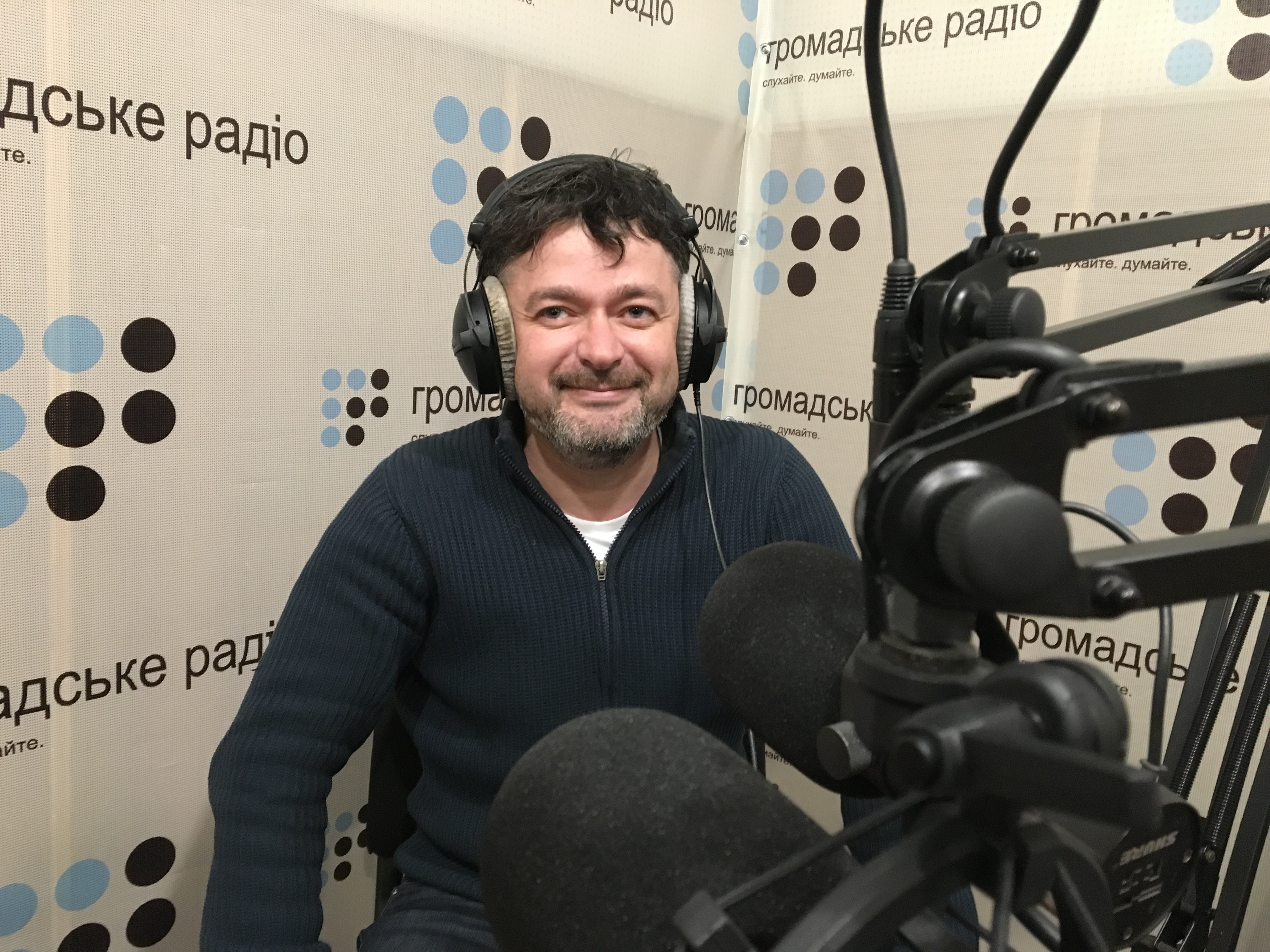
Potekhin: Thank you for inviting me. It’s great to have this conversation with you. It was not an assignment. I was not going to Donetsk within an assignment for my Canadian journal. The assignment was to help write an article about what was going on in the country and that was my own decision to go there. That was risky of course and I tried to get prepared for possible risks but that was my own decision. That’s how I got there and I managed to spend a day in the occupied city of Donetsk and I was captured about one hour before my train back to Kyiv.
Suprun: What were some of the impressions the city had on you?
Potekhin: It’s very strange because it was almost empty. Almost no people on the streets and there were some signs of the terrorists around as the city being controlled by terrorists.
Suprun: What do you mean by some of the signs?
Potekhin: Well, block posts [check points], armed people, and lack of people on the streets. People were not happy with this situation and of course they tried to hide. Lots of people already left the city at that moment. There was shelling, and some buildings ruined. And that was the problem to get a taxi because no one wanted to go around the city while it was controlled by terrorists.
Suprun: They took your phone and one of the things you wrote about. They thought you were a spy because of your Twitter account. Why do you think they associated Twitter with being a spy?
Potekhin: I think that it was not just about Twitter. They would associate spying and everything connected with the Western world, culture, and any way of life. Because they are indoctrinated and anti-Western, anti-Ukrainian, and because they had very strong feelings about all those things. They were looking for signs in people matching their paranoid picture of the world. They were using all those natural and basic things as a way to testify that actually there is all that Western conspiracy against them. That’s how any paranoid mind operates. You have some picture installed in your mind by propaganda machine by repeating information. Then you act in accordance with this picture and excuse your very cruel actions. Your mind is looking for signs that actually would say, “Yes, that paranoid picture is not paranoid. It is true.” There are enough reasons to kill people, to torture them, to bomb the city. When facts are lacking for such a picture, those paranoid minds will look for signs and for anything that looks even remotely attached to that version of their reality or even version of paranoid perception of their reality.
Suprun: Several times you were put in a relative isolation. One time as a punishment for your “complaining” you were put in a room with drug addicts and criminals. They were arresting all sorts of people and holding you in the Izolatsia factory that used to be a cultural platform. You called it a concentration camp. Why?
Potekhin: Initially, I did not perceive that as a concentration camp. But last summer I had a chance to visit Dachau concentration camp, the real concentration camp in Germany.
Suprun: When was this?
Potekhin: It was in the summer of 2015. I had a chance to visit Augsburg. I went there by motorbike. I was travelling back home by bike and managed to get to Dachau. I went there especially to see how it’s different, and I was surprised to see lots of things in common with what I had experienced in Donetsk. Of course there were no gas camera [chamber] and it was not so massive, not thousands of people and not thousands of people killed, but the principles were hundred percent the same. Some of them were even harsher than in Dachau, in the German Nazi concentration camp. The Russian Nazis are not as organized as German Nazis were. So that’s why it took them longer to construct something like that and they are still constructing that.
Suprun: Right, they’re still constructing a system of sorts, a penal system, if we can even call it that. Do you think they are they acting on their own? Or are they taking orders from someone with more experience?
Potekhin: I think it’s both: orders, and a general culture of authoritarianism and dictatorship. Because when they interrogated me I could hear lots of wordings from Soviet and modern Russian movies about war, special forces, spies, and that was not something that people would necessarily get as professional spies. I guess that some of them were just crazy volunteers who learnt lots of things from Russian and Soviet propaganda. But some of them were definitely professionals. Once I was brought to be interrogated by an FSB officer (who was) at the top of the organization. It was professional Russian terrorism, not volunteers. On the level of executives, there were lots of professional people and that enabled me and other prisoners to smuggle some things into the cage. One of the prisoners even managed to escape during a clash. There was a clash between two different terrorist groups for… [laughs] champagne, stolen in the street, actually two cars of champagne. Another group of terrorists came to get it back, so an armed clash started and this Izolyatsia concentration camp was sieged by another group of terrorists. Several prisoners were out of their cells at that moment, and one of them managed to escape.
Suprun: Who were some of the other prisoners that were with you?
Potekhin: Lots of people. And what’s surprising is that most of them were locals. I was just probably one from Kyiv. There were several hundreds of people I met there; just several guys from other parts of the country, but most of them were locals. I think that this is what actually helps break anytotalitarian system.It basically works against the people because of that paranoia, because of their idea that there were spies and there were guys helping to shell their city. They were sure that Ukrainians were shelling the city. I was not sure. I don’t know. I’m not a military expert. So when they wanted me to work for their propaganda, they wanted me to write that actually I saw victims of the Ukrainian operation. I mean I can see the buildings being bombed but I don’t know who did that and I’m not an expert, so I denied it on the grounds that actually it’s not a fact.
Suprun: But they threatened you several times. They interrogated you several times. You witnessed several beatings. You announced a hunger strike and, yet, you took care to make sure that the people you were being held with were still given food. Fear is clearly part of the penal system there. What was one of the worst things that you witnessed?
Potekhin: Well, probably, I would say, that was when somebody was shooting behind your head and giving you orders. It’s tough, but that was closer to the end of my stay there, or of what turned out to be the end of my stay there. But at the moment I was more shocked when I just got there. Closer to the end, after several weeks, you’re getting used to very nasty things. But I was shocked with the local men and women held in the same room, and they were not let out to go to the toilet, to use the restroom. And that’s why I was not complaining, because there is no system of complaints, there is no Rule of law, there was no accusation, there was no procedure, no court. So I was just asking: “Guys, is it a kind of torture room? What are you doing here?” If it’s detention, then provide the rights of the detained people. And I’m more or less OK, it was just the third day, but there were old ladies and of course that was a problem for them and they were not let out to the toilet for several hours although they were asking. I asked about their rights, and that made the deputy head of that concentration camp very angry. In half an hour he moved me to the worst cell in the whole camp and I was kept there for three days. There were more than ten people in a tiny place with no windows and no water in the second or third day. And we were not given a chance to move anything from the cell. That was really tough. There were some drug users who were on substitution treatment plans, who were not given their medicines because the terrorists did not have any idea of how it works and why they needed their medicine. They just believed them to be drug addicts, and that’s it. And at the same time these terrorists were sure that they’re helping to fight drug (addiction)…
Suprun: The fascist junta…
Potekhin: the fascists, Nazis, and you know alcoholism and narcomans [drug addicts], and all those…that was very Soviet.
Suprun: What was the thing you remember most when you were released?
Potekhin: Oh, yes. I heard the Ukrainian language. Because when we crossed the block post [check point], we stopped in the first village in the part of Ukraine controlled by Ukraine, and we went into a drugstore and I tried to get some medicine because I had problems with my stomach. A friend of mine, a western journalist, who helped me to get out of Donetsk, he wanted to buy it for me. I said, “Roman, can I do it myself?” and I asked her [the salesperson] in Ukrainian and I heard she answered in Ukrainian and that was… and I really felt like – OK, now I believe it, that I am free. That was the moment and the real sign, that actually, yes, we can be free and I can enjoy it and I’m home.
Suprun: Ladies and gentlemen – Dmytro Potekhin. We look forward to the book and thank you for joining us.
Potekhin: Thank you for having me tonight, thank you.
CULTURE
Remember the movie, Ace Venture: Pet Detective? Well, sometimes life does in fact imitate art. Activists wereprotesting outside the Kyiv City Hall demanding the creation of a Pet Police. They want the city to create a special unit that would protect homeless animals from “Dog Hunters” that prey on the city’s homeless pet population and raise awareness about animal cruelty. In an interview on Hromadske Radio, an activist said that they want to create a Pet Patrol that would protect animal rights, specifically domestic pets, from cruelty. They created a petition on line and got enough signatures to put the issue on the docket for the Kyiv City Council to consider.
Eurovision is coming to Ukraine in 2017 and now there’s money to make it happen. The Kyiv city council announced that they will be ear-marking 200 million hryvnia[Ukrainian currency] for the show. The government of Ukraine has also said that the new budget will allocate 456 million hryvnia to prepare for Eurovision in Ukraine, that’s almost 20 million US dollars. Eurovision 2016, one of the largest European song contests, was won by Jamala for her song “1944” about Stalin’s forced deportation of hundreds of thousands of Crimean Tatars from their homeland. Over 41 countries have announced their participation in Eurovision 2017 that will be held at Kyiv’s International Exhibition Center that can host about 11,000 attendees. This is the second time that the contest will be held in Kyiv since 2005.
A song I’d like to leave you with is by Plach Yeremiy or “Jeremiah’s Cry” called “Lysh Vona” or “Only Her” that remains very popular in Ukraine. You can hear it sung by people playing guitar around town and at entrances to the Metro.
Tune in next week for a new episode of Ukraine Calling.
If you have any suggestions or comments, feel free to write the show at: [email protected]. I’m Marko Suprun in Kyiv. Thanks for listening.
Interview transcribed by Larysa Iarovenko, Alexander Konovalov, and Oksana Smerechuk. Sound engineer Andriy Izdryk.
